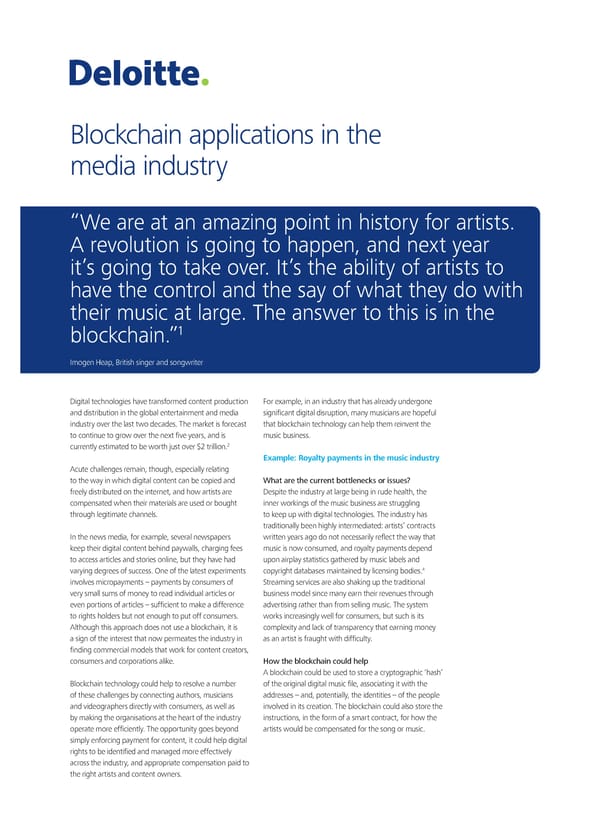To start a new section, hold down the apple+shift keys and click Document Variables to release this object and type the section title in the box below. Document Title Template Document Subtitle Subtitle Blockchain applications in the media industry “We are at an amazing point in history for artists. A revolution is going to happen, and next year it’s going to take over. It’s the ability of artists to have the control and the say of what they do with their music at large. The answer to this is in the 1 blockchain.” Imogen Heap, British singer and songwriter Digital technologies have transformed content production For example, in an industry that has already undergone and distribution in the global entertainment and media significant digital disruption, many musicians are hopeful industry over the last two decades. The market is forecast that blockchain technology can help them reinvent the to continue to grow over the next five years, and is music business. currently estimated to be worth just over $2 trillion.2 Example: Royalty payments in the music industry Acute challenges remain, though, especially relating to the way in which digital content can be copied and What are the current bottlenecks or issues? freely distributed on the internet, and how artists are Despite the industry at large being in rude health, the compensated when their materials are used or bought inner workings of the music business are struggling through legitimate channels. to keep up with digital technologies. The industry has traditionally been highly intermediated: artists’ contracts In the news media, for example, several newspapers written years ago do not necessarily reflect the way that keep their digital content behind paywalls, charging fees music is now consumed, and royalty payments depend to access articles and stories online, but they have had upon airplay statistics gathered by music labels and 4 varying degrees of success. One of the latest experiments copyright databases maintained by licensing bodies. involves micropayments – payments by consumers of Streaming services are also shaking up the traditional very small sums of money to read individual articles or business model since many earn their revenues through even portions of articles – sufficient to make a difference advertising rather than from selling music. The system to rights holders but not enough to put off consumers. works increasingly well for consumers, but such is its Although this approach does not use a blockchain, it is complexity and lack of transparency that earning money a sign of the interest that now permeates the industry in as an artist is fraught with difficulty. finding commercial models that work for content creators, consumers and corporations alike. How the blockchain could help A blockchain could be used to store a cryptographic ‘hash’ Blockchain technology could help to resolve a number of the original digital music file, associating it with the of these challenges by connecting authors, musicians addresses – and, potentially, the identities – of the people and videographers directly with consumers, as well as involved in its creation. The blockchain could also store the by making the organisations at the heart of the industry instructions, in the form of a smart contract, for how the operate more efficiently. The opportunity goes beyond artists would be compensated for the song or music. simply enforcing payment for content, it could help digital rights to be identified and managed more effectively across the industry, and appropriate compensation paid to the right artists and content owners. J3975_BlockchainInsert.indd 7 15/01/2016 17:00
 Blockchains: Enigma. Paradox. Opportunity. Page 25 Page 27
Blockchains: Enigma. Paradox. Opportunity. Page 25 Page 27